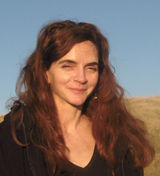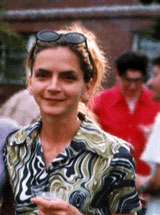

![]()
::: postdoc fellowships
::: senior fellowships
::: resident fellowships
::: associateships
![]()
being here
::: visiting
::: the last donut
::: photo album
::: center home >> people >> visiting fellows, 2003-04 >> roush |
||||
| Sherri
Roush Sherri’s recent interests are the questions of what knowledge is, what evidence is, and whether we should be realists or anti-realists about scientific theories. A belief is not knowledge merely in virtue of coinciding with the truth—that could be accidental. It must coincide with the truth because it is ‘following’ the truth. A fact is evidence for a hypothesis when it is a discriminating indicator of that hypothesis, thus, also when it provides a way of ‘following’ the hypothesis. These are the intuitions behind the tracking accounts of knowledge and evidence developed in her forthcoming book Tracking Truth: Knowledge, Evidence, and Science. Considerations about evidence lead also to a mixed realist-anti-realist view of scientific theories, according to which we should be realists about low-level hypotheses, including some about unobservable entities, and anti-realists about high-level theories. Sherri is currently working on how to model surprisingness of evidence, and also on what knowledge is and how it might have evolved in the framework of evolutionary game theory. In her spare time Sherri reads a lot of newspapers and watches big birds on the Gulf Coast. November 2010 |
|
|||
 Sherrilyn Roush is now Associate Professor of Philosophy, and faculty in the Group in Logic and the Methodology, at the University of California, Berkeley. She is the author of Tracking Truth: Knowledge, Evidence, and Science (Oxford, 2005), written partly during her stay at the Center, and more recently of "Randomized Controlled Trials and the Flow of Information," ‘‘Second- Guessing: A Self-Help Manual,’’ ‘‘Closure on Skepticism,’’ “Love Science,” ‘‘Optimism About the Pessimistic Induction,’ and “Fallibility and Authority in Science and Technology.” Her main current project is on fallibility, self-doubt, and justified belief, which has led to a second-order generalization of Bayesian rationality that shows how coherently to acknowledge and adjust for information about our unreliability.
Sherrilyn Roush is now Associate Professor of Philosophy, and faculty in the Group in Logic and the Methodology, at the University of California, Berkeley. She is the author of Tracking Truth: Knowledge, Evidence, and Science (Oxford, 2005), written partly during her stay at the Center, and more recently of "Randomized Controlled Trials and the Flow of Information," ‘‘Second- Guessing: A Self-Help Manual,’’ ‘‘Closure on Skepticism,’’ “Love Science,” ‘‘Optimism About the Pessimistic Induction,’ and “Fallibility and Authority in Science and Technology.” Her main current project is on fallibility, self-doubt, and justified belief, which has led to a second-order generalization of Bayesian rationality that shows how coherently to acknowledge and adjust for information about our unreliability.